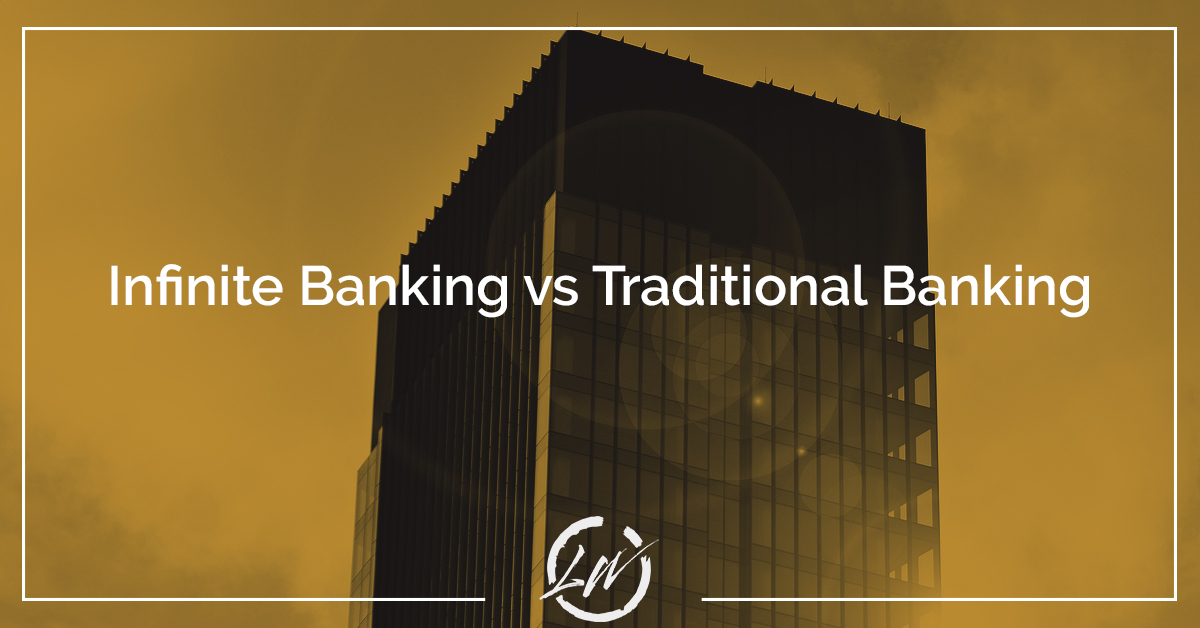The Infinite Banking Concept popularized by Nelson Nash is very different from the conventional banking model that most of us are familiar with. So, let’s examine infinite banking vs traditional banking and their fundamental differences. We’ll also review the unique advantages and principles that set them apart.
The Basics
Let’s start with the basics, comparing infinite banking to traditional banking.
Traditional Banking
Traditional banking refers to the well-established system of banking that most individuals and businesses rely on. It involves depositing money into savings or checking accounts with a bank, which then lends out a portion of those deposits to other customers at interest rates. Traditional banks offer services such as loans, mortgages, and savings accounts.
Infinite Banking
The Infinite Banking Concept, on the other hand, is a financial strategy that revolves around utilizing whole life insurance policies to create a personal banking system. Instead of depositing money into a traditional bank, individuals fund a whole life insurance policy, allowing them to accumulate cash value over time. This cash value can be accessed through policy loans, effectively turning the insurance policy into a source of personal financing.
Ownership and Control
Ownership and control of money in infinite banking are very different from traditional banking.
Traditional Banking
In a traditional banking system, individuals deposit their money into a bank, relinquishing ownership and control of those funds. The bank holds and manages the money, using it for various purposes, including lending to other customers or investing it for its own profit. Account holders have limited control over how their funds are used.
Infinite Banking
With the Infinite Banking Concept, individuals maintain ownership and control of their cash value within the whole life insurance policy. They can access this cash value at any time through policy loans, and the policy continues to grow regardless of whether a loan is outstanding. This level of control allows for greater financial flexibility and the ability to leverage the cash value for various purposes.
Interest and Growth
Interest generation and growth of wealth is very different when it comes to infinite banking vs traditonal banking.
Traditional Banking
Traditional banks pay relatively low-interest rates on savings accounts, and borrowers pay higher interest rates on loans and credit cards. The spread between the two rates represents the bank’s profit margin. Customers benefit from the convenience of a bank but often receive limited returns on their deposits.
Infinite Banking
In the Infinite Banking Concept, the cash value within the whole life insurance policy grows at a guaranteed rate, often higher than the interest rates offered by traditional banks. Additionally, policyholders have the opportunity to earn dividends, further increasing the growth of their cash value. This means that individuals can potentially enjoy higher returns on their money compared to traditional savings accounts.
Tax Benefits
Let’s look at how tax applies to the two different systems.
Traditional Banking
Interest earned on savings accounts in a traditional bank is typically subject to taxation. Additionally, capital gains from investments may also incur taxes when realized. These tax implications can reduce the overall return on investment for individuals.
Infinite Banking
Cash value growth within a whole life insurance policy is tax-deferred, meaning that individuals do not pay taxes on the growth as long as it remains within the policy. Policyholders can access this cash value through policy loans without triggering taxable events. This tax advantage can significantly enhance the overall financial benefits of the Infinite Banking Concept.
Flexibility and Versatility
Is infinite banking a more flexible tool compared to traditional banking? Here’s what you need to know.
Traditional Banking
Traditional banks offer a limited range of financial products and services, primarily focused on savings and lending. Customers are often subject to strict lending criteria, and approval for loans may be challenging for some individuals.
Infinite Banking
The Infinite Banking Concept provides individuals with a flexible and versatile financial tool. Policyholders can use the cash value for various purposes, including funding business ventures, paying for education, or covering unexpected expenses. Since policy loans are self-directed, individuals have greater control over how and when they access their funds.
Legacy Planning
Wealth transfer is another difference between the two approaches.
Traditional Banking
Traditional banks do not typically offer a built-in mechanism for transferring wealth to future generations. Inheritance planning may involve complex legal and financial arrangements.
Infinite Banking
The Infinite Banking Concept can serve as a valuable tool for legacy planning. Policyholders can pass on their whole life insurance policies, along with the accumulated cash value, to heirs, providing a tax-efficient and seamless way to transfer wealth to the next generation.
Two Very Distinct Approaches to Wealth
As yuo can see, infinite banking vs traditional banking is a fascinating comparison of two distinct approaches to managing personal finances and building wealth. Here is the bottom line:
- While traditional banking offers convenience and familiarity, it often falls short in terms of financial control, growth potential, and tax benefits.
- The Infinite Banking Concept empowers individuals with ownership, control, and the potential for higher returns on their money through a carefully structured whole life insurance policy.
- The choice between Infinite Banking and traditional banking depends on a person’s financial goals, risk tolerance, and long-term vision.
- Exploring these differences can help individuals make informed decisions about how to optimize their financial strategies and secure their financial futures.
Need Help With Infinite Banking or More Information on Getting Started?
For a free consultation with our infinite banking experts at Living Wealth, click here. We can help get you started and answer any questions you may have. Also, see our beginners course and infinite banking podcast.






